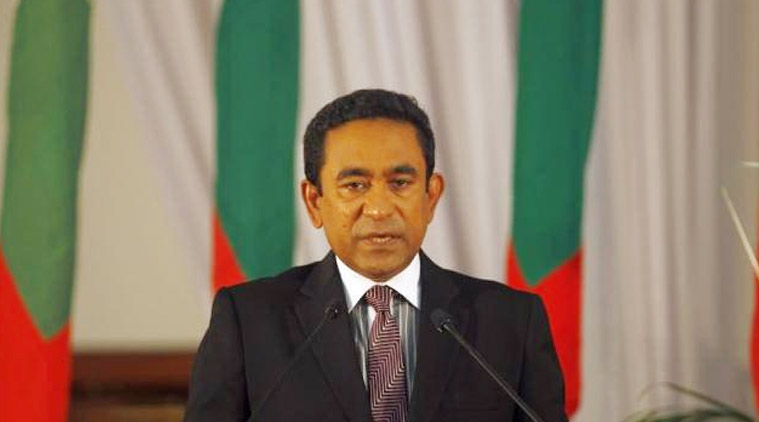 Amendment of Article 251 of the Constitution of Maldives allows foreigners to own freehold land, as long as they meet certain criteria, including that the project built on the land must be approved by Parliament, there must be a minimum investment of US $ 1 billion “in the territory of the Maldives. (Source: AP)
Amendment of Article 251 of the Constitution of Maldives allows foreigners to own freehold land, as long as they meet certain criteria, including that the project built on the land must be approved by Parliament, there must be a minimum investment of US $ 1 billion “in the territory of the Maldives. (Source: AP)
What is the new Maldives land law?
On July 22, the People’s Majlis, the unicameral parliament of the Maldives, passed a bill amending the 2008 Constitution to allow foreign ownership of land. President Yamin Abdul Gayoom ratified the bill the next day. The bill amended Article 251, and added a new chapter to the Maldives Constitution. The amendments submitted on behalf of the Abdulla Yameen government by the ruling Progressive Party of Maldives (PPM) was passed with 70 votes in favour and 14 against, with one MP absent.

READ: New land law in Maldives gives India China chills
What was the Constitution’s Article 251 about?
Article 251 of the Constitution, in its previous form, prohibited foreign ownership of land. It said that: (a) no foreign party, shall own or be given ownership of any part of the territory of the Maldives, (b) a foreign party shall not receive a lease of, or be given in any other way, any part of the territory of the Maldives for a period exceeding 99 years and,(c) no part of the territory of the Maldives shall be used for foreign military purposes without the approval of the majority of the total membership of the People’s Majlis.
What is the amendment?
It allows foreigners to own freehold land, as long as they meet certain criteria, including that the project built on the land must be approved by Parliament, there must be a minimum investment of US $ 1 billion “in the territory of the Maldives”, and upon the project’s reaching completion, “at least 70 per cent of the land must have been reclaimed from the ocean and be visible at medium tide”. It also declares that allowing a foreign party to own land under these specific circumstances “does not undermine the Maldivian state’s sovereignty over its territory and does not amount to loss of territory”.
Why was this amendment done?
Depends on who is answering. The Maldives government has said that the new law is meant to “attract mega development projects and generate jobs” in the country. The opposition says the amendment is intended to facilitate the extension of China’s influence and foothold in the Indian Ocean region, to enable Chinese investment in the Maldives, and even possibly, to “pave the way for Chinese military facilities in the country”. Critics have also questioned the speed with which the amendment was passed without adequate consultation and parliamentary debate.
How has India reacted to the change of law?
Indian government officials have voiced concern that the law will be used by China to extend its military influence, but they have been assured by the Government of the Maldives that the Indian Ocean would remain “a demilitarised zone”. Foreign Secretary S Jaishankar visited Maldives and met the top political leadership, where they discussed the issue. New Delhi can be expected to monitor the developments closely.
Why is India worried?
Story continues below this ad
While it is true that Indian investors too can buy land provided they are willing to invest a billion dollars and reclaim land, the road looks difficult as of now. New Delhi and Male do not currently have the best of relations. India has been critical of former President Mohamed Nasheed’s imprisonment, and called off Prime Minister Narendra Modi’s visit in March this year. Besides, China is known for reclamation of land from the sea, with its immense dredging capabilities on display in the South China Sea. With Beijing taking a keen interest in expanding its strategic footprint in South Asia and the Indian Ocean, India has good reasons to worry.
What is the nature of the China-Maldives relationship?
New Delhi sees the latest development in the context of President Abdulla Yameen’s foreign policy shift since last year. Chinese President Xi Jinping was the first head of state to visit the Maldives after Yameen assumed power. During the visit, the Maldives agreed to become a partner in China’s maritime silk route, a trade route from China’s Fujian province to the Mediterranean Sea via South Asia and East Africa. China is also providing grants and loans to the Maldives to build a bridge between the capital and the airport. Chinese companies are involved in work on the airport, too, and have been handed islands for developing resorts. China’s maritime silk route initiative is projected to enable major projects like the Male-Hulhule bridge and the new runway for the airport to come to fruition. China has said that it will also enhance Maldivian products like fish to be exported to China, and cheaper and better Chinese products to be imported to Maldives by establishing a Free Trade Area between the two countries. China has also said that it will provide more training opportunities and scholarships for the people of Maldives.

 Amendment of Article 251 of the Constitution of Maldives allows foreigners to own freehold land, as long as they meet certain criteria, including that the project built on the land must be approved by Parliament, there must be a minimum investment of US $ 1 billion “in the territory of the Maldives. (Source: AP)
Amendment of Article 251 of the Constitution of Maldives allows foreigners to own freehold land, as long as they meet certain criteria, including that the project built on the land must be approved by Parliament, there must be a minimum investment of US $ 1 billion “in the territory of the Maldives. (Source: AP)





































